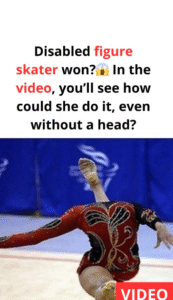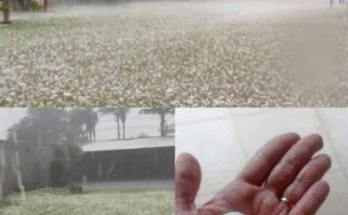“She Proved Anything Can Be Achieved: The Uplifting Story of the Skater Who Overcame Every Obstacle.”
From the time little Marissa Bennett laced up her first pair of used, scuffed skates—borrowed from a neighbor and several sizes too big—something inside her awakened. She was only seven, a quiet child with oversized dreams she didn’t yet know how to express, but the moment she stepped onto the rink’s cold surface, she felt the world around her stretch wide open. The ice became a place where nothing felt too heavy, too loud, or too impossible. It was the first time she felt weightless in a world that often seemed determined to pull her down.
Marissa grew up in a small town where dreams were often replaced with responsibilities. Her mother worked double shifts at a diner, and her father—once a construction worker with sturdy hands and laughter that filled rooms—had been bedridden after a workplace accident. Money was tight, time tighter, and skating lessons were a luxury far outside their reach. Yet every weekend, when the public rink opened, Marissa begged her mom for a single hour on the ice. “Just one,” she’d plead, promising extra chores, better grades, anything. And most weekends, her mother found a way.
While other kids glided effortlessly in brand-new gear, Marissa fell, slipped, crashed, and rose again—over and over. She never seemed embarrassed. Instead, each fall sparked something fiery in her: a determination so bright that even the rink manager, old Mr. Larsen, noticed. “You’ve got grit,” he’d tell her. “And grit outlasts talent.” He often let her stay a few minutes after closing, long after the other skaters had gone home.
It was during one of these quiet, dimly lit evenings that Marissa felt something shift inside her. She pushed off, faster than she ever had before, and landed her first clean single axel. The sound that burst out of her—half laughter, half disbelief—echoed around the empty rink. For the first time, she knew she wanted skating not just as a hobby, but as a future.
But life has a way of testing the dreams we dare to claim.
When Marissa turned eleven, her father’s condition worsened. Medical bills piled up, and her mother’s exhaustion became impossible to hide. One evening, after a particularly hard day, her mother sighed, “Sweetheart… I don’t think we can keep paying for the rink. I’m sorry.” Marissa nodded, forcing a smile, but her heart cracked. For the next year, the rink became a distant memory—a world she had once belonged to but could no longer touch.
Yet dreams don’t disappear; they whisper, they ache, they wait.
Everything changed the day Mr. Larsen showed up at their doorstep. “I’ve watched this girl skate,” he told her mother. “She has something special. Something rare. Let me sponsor her sessions.” Her mother resisted at first, pride stiffening her voice, but Mr. Larsen gently insisted. “Think of it as an investment in possibility.” Finally, with tears in her eyes, she relented.
And so, Marissa returned to the ice.
She trained relentlessly. The rink became her refuge, her classroom, her compass. She practices spins until she felt dizzy, footwork until her ankles screamed, jumps until her legs trembled beneath her. She studied YouTube clips of her favorite skaters, mimicking their form, their grace, their rhythm. And slowly, piece by piece, she built herself into a true competitor.
At fourteen, wearing a simple homemade dress stitched by her mother, Marissa entered her first regional competition. She didn’t place. In fact, she fell—twice—her palms burning against the cold surface. On the ride home, she stared out the window silently while her mother tried to console her. “You tried your best,” she said. But Marissa didn’t cry. She didn’t quit. She promised herself she would return stronger.
The following year, she did.
And this time, she not only placed—she won third.
It was a small medal, bronze and hardly glamorous, but to Marissa it gleamed brighter than gold. It represented every fall, every early morning practice, every sacrifice her family had made. And it proved that she belonged.
Over the next few years, her name began appearing more frequently in rankings and competition lineups. But with success came new challenges—higher expectations, bigger rivals, and pressure so heavy it felt like a weight strapped to her chest. When she was seventeen, during a crucial qualifying event, Marissa attempted a jump combination she’d landed perfectly in practice. But mid-air, her blade caught the ice. She crashed hard, injuring her ankle badly enough to sideline her for months.
Doctors were cautious. Some whispered that the injury might end her competitive career altogether. For the first time in her life, Marissa felt fear creeping in—cold, sharp, and unrelenting. What if she had pushed too hard? What if she lost everything she had fought for?
But in that darkness, her mother reminded her: “You’ve never been the kind of girl who quits. You fight. You rise.”
And she did.
Rehab was slow, painful, and filled with doubt. There were days she could barely walk without wincing. Days she wondered if the ice had forgotten her touch, or worse—if she had forgotten how to fly. But she kept going, one step at a time. Grit, after all, always had been her superpower.
By the time she returned to skating, Marissa had transformed. She was not just technically strong—she was mentally unshakable. She had battled fear, pain, and setbacks, and she had emerged with a fire that could not be extinguished.
At nineteen, she entered the National Championships.
The arena lights were blinding. The air buzzed with anticipation. As she took the ice, wearing the same homemade dress—now re-stitched and slightly updated—she felt a sense of calm wash over her. This was her place. Her home. Her story unfolding in real time.
The music began.
Marissa moved with a grace that told her entire journey without a single word. Her jumps soared, her spins carved poetry into the ice, and each element landed with the confidence of a girl who had fought to be here. When she executed her final combination—a breathtaking series she once feared she’d never perform again—the crowd erupted in applause before she even finished.
When her score flashed on the screen, Marissa gasped.
First place.
Tears streamed down her face as she realized what it meant—not just the victory, but the journey. She had proved something greater than talent, greater than perseverance. She had proved that no obstacle is too large for a heart that refuses to give up.
And in that moment, she wasn’t just a skater.
She was a symbol of possibility.
Of resilience.
Of a truth she had carried with her since the day she stepped onto the ice for the first time:
Anything can be achieved—if you dare to keep going.


